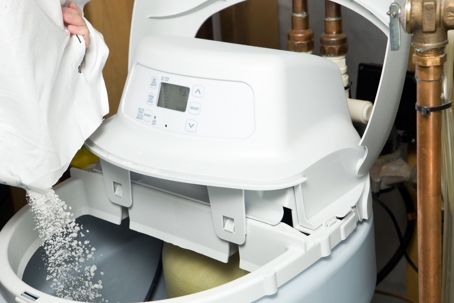Wondering if your water softener is working properly? The quickest way to tell is by noticing softer skin and hair after showering, less soap scum buildup on dishes and fixtures, and improved water flow. If you’re still unsure, testing your water hardness or tasting it to check for a salty flavor can help confirm its effectiveness.
For reliable water softener installation, maintenance, or troubleshooting, trust Dailey Company to keep your water soft and your system running smoothly. Contact us today for expert service and peace of mind.
Why Water Softeners Matter
Knowing how a water softener functions helps identify changes in performance. Water softeners tackle hard water by removing calcium and magnesium, the minerals responsible for scale buildup. Through ion exchange, these minerals are swapped out for sodium ions, resulting in water that's kinder to your plumbing and appliances.
Softened water supports the efficiency of home systems. Hard water may lead to mineral buildup in pipes, reduced appliance function, and skin dryness. Keeping a water softener in working condition limits these issues. Regular monitoring allows small problems to be managed before they become more disruptive.
How to Tell If Your Water Softener Is Working
Checking water softener performance involves several simple observations. First, pay attention to how your water feels. Soft water should feel smooth and silky, unlike hard water, which can leave a film on your skin. Watch how soap reacts; it should lather quickly and rinse off cleanly in treated water.
Next, inspect the salt levels in your brine tank. A correctly operating system will use salt regularly, so a consistently high level may indicate a malfunction. A water hardness test kit from a hardware store can help verify whether minerals like calcium and magnesium are being removed. Cloudy glassware or spotting on dishes may also indicate reduced softening. Unusual odors or changes in water clarity can further suggest that the system isn't functioning as expected.
Signs Your Water Softener Is Not Working
Spotting signs that your water softener isn't working can save you from bigger headaches later. Look for the return of hard water symptoms, like mineral stains on your fixtures or dishes. A drop in water pressure might mean the resin bed is clogged.
Unusual sounds coming from the unit may suggest mechanical problems or internal blockages. Excessive salt use or frequent regeneration cycles can also indicate reduced efficiency. If your laundry feels stiff or colors fade more quickly, untreated hard water may be affecting fabric quality.
Quick Checks and Troubleshooting Tips
Before seeking professional help, try a few basic steps. Confirm that the bypass valve is in the correct position, since a system in bypass mode will not treat the water.
Cleaning the brine tank and resin bed may restore performance if buildup is present. Review the timer and settings on the unit, as disruptions from power loss or accidental adjustments can interfere with proper operation.
When to Call a Professional
Sometimes, professional help is the best course of action. If troubleshooting doesn't solve the issue, if you face persistent mechanical problems, or if you need replacement parts, it's time to call in the experts.
At Dailey Company, our technicians are ready to tackle any water softener issues, ensuring your system runs smoothly and your water quality remains high.
Schedule a Water Softener Check Today
Keeping your water softener in good shape requires regular maintenance and attention. By monitoring its performance and spotting early signs of trouble, you can avoid costly repairs and extend its lifespan. If problems persist or you need expert advice, reach out to Dailey Company. Our team is committed to excellent service and ensuring your plumbing systems work perfectly. Contact us to schedule a consultation with our experienced professionals.

